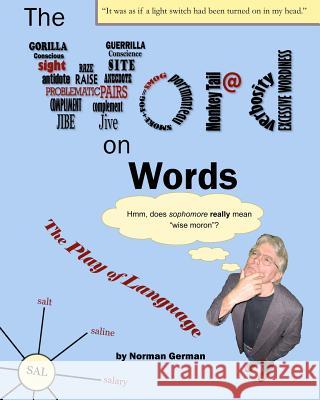The Word on Words: Black-and-White Classroom Edition » książka
The Word on Words: Black-and-White Classroom Edition
ISBN-13: 9781463630546 / Angielski / Miękka / 2011 / 128 str.
Awarded "Best of 2011" in Arts & Letters by Kirkus Review
By special request, this BLACK-AND-WHITE "Classroom Edition" is now available. The cover is still COLOR.
KIRKUS REVIEW (posted in its entirety)
The English language gets pulled up by its roots for purposes of entertainment, enlightenment and vocabulary building in this sprightly linguistic romp.
The author, an English professor, introduces readers to some of the knottier words in the language through an approach that mixes analysis, history and lots of engaging anecdotes. His method is to seize on dusty old lexical roots, usually from Latin but also from Greek, Old English, Norse and French, and follow their branchings through the modern English words derived from them, with plenty of lore and intriguing digressions thrown in to make the pedagogy go down easy. He traces the Latin verb spectare (to watch), for example, through its many incarnations, from spectacle to expectant, while tossing in allusions to Shakespeare and Byron and an aside on the evolution of false eyes as defensive camouflage in the animal kingdom.
German takes a meandering path through the lexicon, always happy to wander off on oddball excursions to, say, palindromes ("senile felines"), spoonerisms (after Rev. Spooner, who reminded one bridegroom that it's "kisstomary to cuss the bride"), bizarre phobias (arachibutyrophobia, he says, is the fear of sticky peanut butter), lyrically named bird collectives (exaltations of larks, wisps of snipe and parliaments of owls), unsafe anagrams (rearrange mother-in-law and you get "woman Hitler") and miscellaneous life lessons (" n]ever use a poly-syllabic Latin word where a one-syllable Anglo-Saxon word will do"). Along the way, German defines over 1,500 big, troublesome words and reinforces reader retention with engaging exercises, including crossword puzzles and fill-in-the-blank quizzes that require one to insert the words aardvark, blasphemy, cremains, cyborg and eunuch into plausible sentences. It's a fun read that sparkles with photographs, bright colors and crazy-quilt fonts. But this smorgasbord is still a serious textbook-readers will gain not just a store of factoids, but a sharpened ability to analyze new words and a deeper appreciation for the history and beauty of the language.
Lively, informative and thoroughly beguiling.
*End of Review*
This is NOT your parents' vocabulary book. The Word on Words is a new kind of vocabulary book, combining learning and entertainment like no text you've ever read.
The Word on Words defines 1,500 words in the context of fascinating essays about art, history, literature, philosophy, pop culture, sports, mythology, and more. In addition to definitions, The Word on Words emphasizes the artistic and playful aspects of language-hence its subtitle, The Play of Language. As my wife says, "You learn better if you have a smile on your face."
The book has five major focuses: vocabulary, etymology, mnemonic devices, usage, and the ludic or playful aspects of language. The Word on Words is ideal for those preparing for aptitude tests such as the SAT, ACT, and NTE. Great for GED study
It's perfect, too, as a supplemental text in ESL classes directed towards those acquiring English as a second language. It's all in here: humorous explanations of palindromes, acronyms, anagrams, spoonerisms, malapropisms, portmanteau words and even false splitting-the way "a napple" transformed into "an apple"-in the context of revelatory essays about phobias, Mother's Day, the birds and the bees, Father's Day, the calendar, Halloween, Thanksgiving, Christmas, and the origins of first and last names, the days of the week, and the months of the year: all emphasized by entertaining end-of-chapter tests and crossword puzzles
Zawartość książki może nie spełniać oczekiwań – reklamacje nie obejmują treści, która mogła nie być redakcyjnie ani merytorycznie opracowana.











